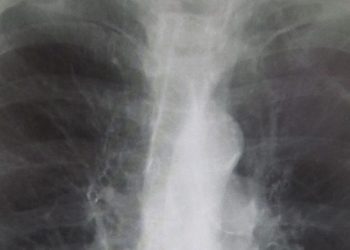Decreased unnecessary urine cultures associated with decreased asymptomatic bacteriuria-related antibiotic use
1. This quality improvement study’s results suggested that more selective urine testing was conducted in 3 years as the percentage of patients with a positive urine culture with asymptomatic bacteriuria (ASB) (diagnostic stewardship metric) declined from 34.1% to 22.5%.
2. The percentage of patients with ASB who received antibiotics (antibiotic stewardship metric) and antibiotic duration for ASB did not significantly change (82.0% to 76.3% and 6.38 to 5.93 days).
Evidence Rating Level: 2 (Good)
Study Rundown: It is very common for hospitalized patients to experience ASB. Treatment of ASB with antibiotics often does not improve outcomes but rather exposes patients to antibiotic-associated harm, including adverse drug events and resistance, potentially prolonging hospital stays. With this said, antibiotic overuse is still prevalent, so this quality improvement study sought to determine whether stewardship focused on diagnostic testing or antibiotic treatment is associated with reduced ASB treatment in hospitalized patients. It was found that diagnostic stewardship (reducing unnecessary urine cultures) was associated with decreased ASB-related antibiotic use, while antibiotic stewardship (reducing unnecessary antibiotic use in asymptomatic patients found to have a positive urine culture) did not reveal significant associations. One study limitation is the absence of data on hospitalized patients who didn’t undergo urine cultures, making it uncertain if they received antibiotic therapy. In conclusion, these findings suggest hospitals should prioritize diagnostic stewardship to decrease ASB-related antibiotic treatment.
Click to read the study in JAMA Internal Medicine
Click to read an accompanying editorial in JAMA Internal Medicine
Relevant Reading: Risk Factors and Outcomes Associated With Treatment of Asymptomatic Bacteriuria in Hospitalized Patients
In-Depth [prospective cohort]: This study was a 3-year (from July 2017 to March 2020), 46-hospital quality improvement study including 14572 patients with positive urine cultures. This study was a part of the Michigan Hospital Medicine Safety Consortium (HMS), a statewide collaborative quality initiative to measure and improve the quality of existing care practices through three main pillars: data with benchmarking, sharing of best practices, and pay-for-performance data. Patients were qualified for inclusion if they were admitted to an HMS hospital, had a positive urine culture, and did not receive antibiotics for another infection during their hospital stay. Patients were categorized as having ASB if they showed no signs or documented symptoms of a urinary tract infection (UTI) according to national guidelines. The primary outcomes were the overall ASB-related antibiotic use metric (ASB treated with antibiotics / (UTI treated with antibiotics + ASB treated with antibiotics)), diagnostic stewardship metric (ASB (ie, treated + untreated) / Positive urine culture (ie, UTI + ASB)), and antibiotic stewardship metric (ASB treated with antibiotics / ASB (ie, treated + untreated)).
Overall ASB-related antibiotic use decreased over the study period from 29.1% (95% CI, 26.2%-32.2%) to 17.1% (95% CI, 14.3%-20.2%). With regards to diagnostic stewardship, there was a decline in the percentage of patients with a positive urine culture who had ASB from 34.1% (95% CI, 31.0%-37.3%) to 22.5% (95%CI, 19.7%-25.6%). With regards to the antibiotic stewardship metric, the percentage of patients with ASB who received antibiotics did not significantly differ from 82.0% (95% CI, 77.7%-85.6%) to 76.3% (95% CI, 68.5%-82.6%). The antibiotic duration for ASB also did not significantly change (6.38 days (95% CI, 6.00-6.78 days) to 5.93 days (95% CI, 5.54-6.35 days)).
Image: PD
©2023 2 Minute Medicine, Inc. All rights reserved. No works may be reproduced without expressed written consent from 2 Minute Medicine, Inc. Inquire about licensing here. No article should be construed as medical advice and is not intended as such by the authors or by 2 Minute Medicine, Inc.







